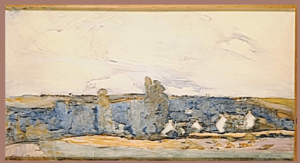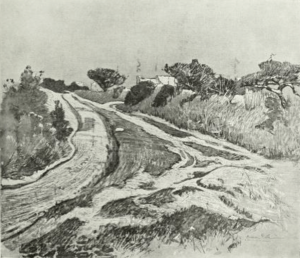Florence Esté facts for kids
Quick facts for kids
Florence Esté
|
|
|---|---|
| Born | 1860 |
| Died | April 25, 1926 (aged 65–66) |
| Nationality | American |
| Occupation | Painter |
Florence Esté (born 1860 – died April 25, 1926) was an American artist. She was born in Cincinnati, Ohio. Florence Esté was especially known for her beautiful landscape paintings.
She worked with different art materials. These included oils, watercolors, and pastels. She also created art by etching and engraving. Her landscapes were special because they were said to be influenced by Japanese art. People noted them for their "harmony of color." The New York Times newspaper called her "one of the best known women landscape painters."
Contents
Becoming an Artist
Florence Esté began her art journey at a young age. In 1874, when she was a teenager, she traveled to France. There, she studied with a famous artist named Tony Robert-Fleury. She also worked alongside other artists like Emily Sartain and Jeanne Rongier.
Between 1876 and 1882, she studied at the Pennsylvania Academy of the Fine Arts. Her teacher there was Thomas Eakins, a very important American painter. Later, around 1886–1887, she took private art classes. She studied with William Sartain at the Philadelphia School of Design for Women. Her friends, including Cecilia Beaux, also studied with her.
In 1884, Florence Esté learned a special art technique called etching. This involves using acid to create designs on metal plates. She learned this skill from Stephen Parrish. Many women artists at the Pennsylvania Academy became important in the "American etching revival." This was a time when etching became very popular again.
Life and Art in France
In 1888, Florence Esté moved to France permanently. She lived in Paris and continued her art studies. She attended the Academie Colarossi. She also learned from artists like Alexandre Nozal and Raphael Collin.
Florence Esté stayed in France even during World War I. Another American artist, Elizabeth Nourse, wrote about her in 1915. She said that Florence Esté was painting in Paris again. This was after an exciting summer, as her village had to be evacuated because of the war.
Florence Esté became a member of the Société Nationale des Beaux-Arts in France around 1909. This was a big honor. She showed her paintings at the famous Paris salons. These were large art exhibitions. The French government bought two of her paintings. In 1918, they bought Un Bourg breton (A Breton village). In 1921, they bought La Vallée (The Valley). Some of her artworks were even displayed in the Luxembourg Gallery in Paris. This is a very important art museum.
She was also an honorary member of the Philadelphia Water Color Club in America. She continued to show her art in the United States. Her paintings were seen at the Annual Philadelphia Watercolour Exhibition. They were also shown at the Art Institute of Chicago and the Pennsylvania Academy of the Fine Arts. In 1925, her watercolors won a special prize from the Pennsylvania Academy of the Fine Arts.
The Armory Show of 1913
The 1913 Armory Show was a very important art exhibition in New York City. It was one of the first shows to display "new art" or modern art in America. Many artists showed their work there.
Fifty women artists participated in this show. This was about one-sixth of all the artists. These women were important leaders in the art world. They helped start what we now call the feminist art movement.
Florence Esté showed two of her watercolors at the Armory Show. These paintings were called The Village and The First Snow. The First Snow had been shown before. A review said it was "an interesting picture, almost in monotone... most effective in the simplicity of the medium."
Her Friends and Later Life
Florence Esté had many good friends from her art school days. These included Elizabeth Macdowell Kenton, Alice Barber Stephens, Mary K. Trotter, and Gabrielle D. Clements.
Florence Esté passed away in Paris on April 25, 1926.
See also
 In Spanish: Florence Esté para niños
In Spanish: Florence Esté para niños




